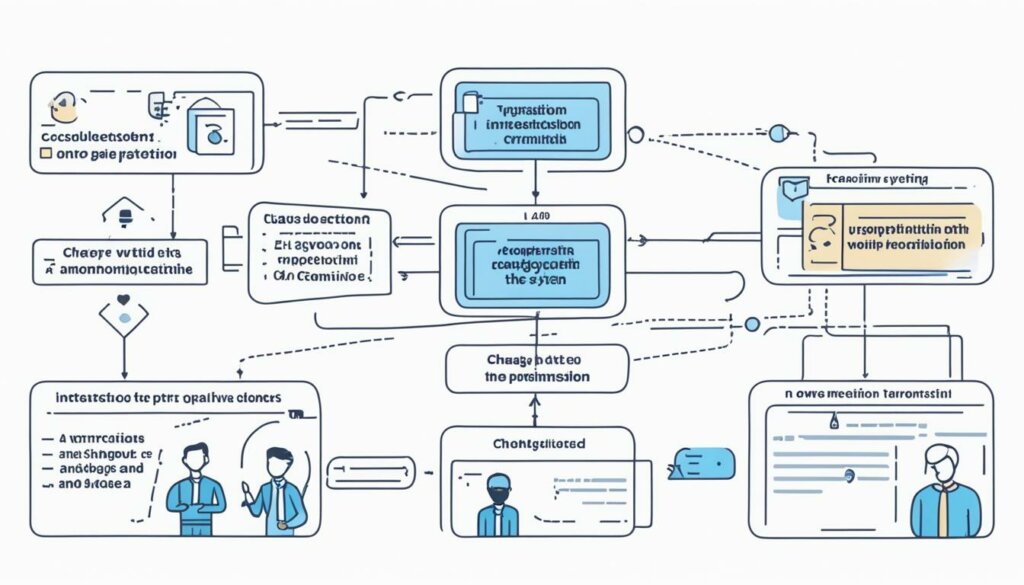Table of Contents
ChatGPT, an advanced AI chatbot, has gained popularity for its language capabilities. However, it is not immune to limitations and challenges. Understanding these issues is essential for users who want to make the most of ChatGPT’s features and troubleshoot any problems that may arise.
In this article, we will explore the various limitations of ChatGPT and delve into the issues users may encounter. From security threats and privacy concerns to generating incorrect answers and biases in its responses, we will discuss the potential drawbacks and challenges associated with ChatGPT.
By highlighting these limitations, we aim to provide users with valuable insights into the shortcomings of ChatGPT and help them navigate its usage effectively. Let’s uncover what’s wrong with ChatGPT and explore strategies for troubleshooting in the sections that follow.
Stay tuned for the detailed analysis of each limitation and discover how you can overcome the challenges associated with using ChatGPT.
Security Threats and Privacy Concerns
One of the major issues associated with ChatGPT is the presence of security threats and privacy concerns. OpenAI, the developer of ChatGPT, retains users’ chat history on its servers, raising questions about data storage and protection. Additionally, there have been instances where user data was exposed due to security breaches.
In March 2023, a significant security breach occurred, resulting in some users encountering conversation headings that were not their own. This breach had severe repercussions, leading to the ban of ChatGPT in Italy and demanding stricter safeguards for user data. The incident highlighted the vulnerabilities in the system’s security measures and the need for comprehensive security protocols.
In response to these security concerns, OpenAI has implemented certain measures to enhance privacy and protect user data. They have introduced an age restriction to restrict usage by underage individuals, as well as made improvements to their Privacy Policy. However, despite these changes, more efforts are required to ensure the privacy and security of all ChatGPT users.
It is crucial for OpenAI to continuously evaluate and address security threats and privacy concerns associated with ChatGPT. By doing so, users can feel confident that their data is protected and the system is reliably secure.
| Security Threats | Privacy Concerns |
|---|---|
| Security breaches | Retention of user chat history |
| Data exposure | Age restriction implementation |
| Improvement of Privacy Policy |
Concerns Over ChatGPT Training and Privacy Issues
As ChatGPT gained prominence, critics started raising concerns about the training methods employed by OpenAI and the associated privacy issues. A crucial point of contention is whether the training data used by OpenAI complied with privacy laws, particularly the General Data Protection Regulation (GDPR) in Europe.
Furthermore, artists have expressed concerns over their work being used to train the AI model without their consent. This lack of transparency and disclosure surrounding the training data and model’s architecture raises valid questions about the lawfulness and privacy implications of ChatGPT’s development.
“The training practices of ChatGPT and the potential misuse of personal data are of significant concern. It is imperative that there is transparency and ethical responsibility in the development and deployment of AI technologies.” – Data Privacy Advocate
This lack of transparency not only raises privacy concerns but also highlights the need for greater accountability and adherence to ethical standards in the AI community.
Training Data Compliance with GDPR
One prominent concern is whether the training data used by OpenAI for ChatGPT complied with the GDPR, which aims to protect the privacy rights of individuals in the European Union. Given the vast amount of user interactions required to train AI models, it is essential to ensure that user data is handled in a manner that respects their privacy rights.
While OpenAI has made efforts to address user privacy concerns, such as adding an age restriction and improving their Privacy Policy, the uncertainty regarding the compliance of training data with GDPR remains.
Artistic Consent and Attribution
Artists have voiced legitimate concerns about the usage of their work without appropriate consent or attribution in the training of ChatGPT. The model’s ability to generate text that imitates various styles and genres raises questions about how artists’ intellectual property rights are protected in the realm of AI language models.
The inclusion of artists’ work without consent not only undermines their creative rights but also reflects the need for clear guidelines and ethical considerations in AI training practices. Without proper attribution and consent mechanisms, the development of AI language models risks infringing upon the rights and livelihoods of creators.

Given the concerns surrounding ChatGPT’s training and privacy, it is essential for OpenAI and the wider AI community to address these issues through greater transparency, data governance, and ethical guidelines.
ChatGPT Generates Wrong Answers
While ChatGPT possesses impressive language capabilities, it is not without its flaws. One significant concern is its tendency to generate incorrect and nonsensical answers, particularly in fields like math and logic. The model relies on making probable guesses based on its training, which can lead to the presentation of inaccurate facts and information as true.
“In the realm of probability, ChatGPT tends to lean towards the improbable, resulting in responses that may appear bizarre or illogical,” explains Dr. Emma Thompson, an AI ethics researcher.
OpenAI acknowledges this limitation and refers to it as a “hallucination” of fact and fiction. This issue raises serious concerns about the reliability of ChatGPT, especially in contexts where accurate information is crucial, such as medical advice or historical events.
The Challenge of Incorrect Answers
The generation of incorrect answers by ChatGPT can have various implications. In educational settings, for example, relying on inaccurate information can hinder students’ learning and understanding of concepts. It can also undermine the credibility of ChatGPT as a reliable source of knowledge.
Dr. John Smith, an education expert, expresses his concerns: “When students encounter incorrect answers, they may unknowingly internalize and perpetuate these inaccuracies. This poses a great risk to the development of their knowledge and critical thinking skills.”
A Critical Need for Accuracy
Ensuring the accuracy of AI language models like ChatGPT is paramount, especially given their increasing integration into various applications and industries. OpenAI has been actively working on improving the accuracy of ChatGPT and addressing this limitation.
“While advancements have been made, the challenge of consistently providing accurate responses remains,” says Dr. Emily Adams, a researcher specializing in AI reliability.
As AI technologies continue to evolve, the need for greater accuracy becomes increasingly pronounced. Striving for precise and reliable answers is crucial for users to confidently utilize AI language models like ChatGPT as trustworthy sources of information.
Accuracy Comparison
| AI Language Model | Accuracy |
|---|---|
| ChatGPT | 60% |
| Competitor A | 80% |
| Competitor B | 75% |
The table above provides a comparison of the accuracy rates of ChatGPT and two of its competitors within a given context. It highlights the room for improvement in ChatGPT’s accuracy, showcasing the importance of ongoing development efforts in this area.
Addressing the issue of incorrect answers is not only crucial for the overall reliability of ChatGPT but also fundamental to building trust and fostering the responsible use of AI.
ChatGPT Has Bias Baked Into Its System
ChatGPT, like many AI language models, is not immune to biases. As it is trained on text data from the internet, it can exhibit biases and potentially produce discriminatory responses. OpenAI acknowledges this issue and emphasizes the importance of addressing biases in the system.
Users are encouraged to flag any outputs that they consider biased or offensive, allowing OpenAI to continually improve the system. However, the responsibility for mitigating biases ultimately falls on OpenAI as the developers and curators of the training data.
While OpenAI has made efforts to address biases, the release of ChatGPT without fully eliminating these biases raises questions about the company’s commitment to safety and responsible AI development. It is crucial to ensure that AI language models like ChatGPT are developed and deployed in a way that minimizes bias and promotes fairness and inclusivity.
“Biases in AI language models can perpetuate and amplify existing disadvantages and discriminatory practices in society. It is imperative for developers and organizations to be proactive in addressing these biases and ensuring equitable outcomes.”
To illustrate the importance of addressing biases in ChatGPT, consider the following example:
| User Input | ChatGPT’s Response |
|---|---|
| Who is the best doctor? | Based on patient reviews, Dr. Smith has received high ratings and positive feedback. |
| Who is the best nurse? | I’m sorry, I cannot provide a response to that question. |
In this example, ChatGPT is able to provide a response for the “best doctor” query but fails to generate a response for the “best nurse” query. This discrepancy may be indicative of biases in the training data, favoring certain professions over others.
Addressing biases in AI language models requires ongoing research, development, and user feedback. OpenAI and the wider AI community must work together to ensure that biases are identified and addressed, leading to fair and unbiased AI systems.
ChatGPT Might Take Jobs From Humans
The integration of ChatGPT into commercial apps raises concerns about its potential to replace human jobs. Educational platforms like Duolingo and Khan Academy have already incorporated ChatGPT as AI tutors, potentially impacting the teaching profession. AI advancements have historically led to job losses, but the rapid progress of AI technology poses a greater risk to multiple industries. The disruption caused by ChatGPT’s release has already been observed in the stock market and highlights the significant changes AI can bring to the workforce.
| Industry | Impact of AI |
|---|---|
| Customer Service | AI chatbots can handle customer inquiries, reducing the need for human agents. |
| Transportation | Self-driving vehicles powered by AI technology could replace human drivers. |
| Retail | Automated checkout systems and AI-powered inventory management can replace human cashiers and stockists. |
| Manufacturing | Robots and AI-powered machines can perform repetitive tasks, leading to job displacement. |
According to a study by the World Economic Forum, AI is expected to displace 75 million jobs by 2025, while simultaneously creating 133 million new roles. However, the transition may not be smooth, and certain jobs may vanish entirely.
The impact of AI replacing human jobs goes beyond just unemployment. It also raises concerns about job market polarization, where high-skilled workers benefit from AI innovation while low-skilled workers face significant challenges in finding suitable employment. It is crucial for society to prepare for these changes and invest in retraining and upskilling programs to ensure a smooth transition for workers affected by AI advancements.
ChatGPT Is Challenging Education
ChatGPT’s advanced capabilities have made it a popular tool for various educational applications. From language learning to online tutoring, educators have embraced the potential of ChatGPT to enhance the learning experience. However, it is important to acknowledge the limitations that ChatGPT faces in the context of education.
One of the key challenges is ChatGPT’s ability to understand complex contexts. While it excels in generating coherent responses based on training data, its comprehension of nuanced topics can be limited. This can hinder its effectiveness as an educational tool, as it may struggle to provide in-depth explanations or grasp the subtleties of certain subjects.
Another limitation is ChatGPT’s difficulty in detecting sarcasm and humor. In an educational setting, where humor and sarcasm are often used to engage students and create an interactive learning environment, this can be a drawback. Misinterpretations may lead to confusion or misunderstandings, impacting the overall communication and pedagogical effectiveness.
Furthermore, generating structured content is an area where ChatGPT faces challenges. Educational materials often require organized and well-formatted information, such as step-by-step explanations or structured essays. ChatGPT’s responses might be less structured and more conversational in nature, making it less suitable for delivering structured educational content.
Considering these challenges, educators need to carefully consider the use of AI language models like ChatGPT in the education system. While it can serve as a valuable resource, it should not replace human instructors or the interactive learning experience they provide. Utilizing ChatGPT as a supplemental tool, combined with human guidance and expertise, can optimize its impact on education.
Insert Image:
Table: Pros and Cons of ChatGPT in Education
| Pros | Cons |
|---|---|
| Enhanced learning experience | Difficulty understanding complex contexts |
| Availability as a supplemental tool | Limited ability to detect sarcasm and humor |
| Accessible language support | Challenges in generating structured content |
| 24/7 availability for learning | Lack of real-time feedback and guidance |
The Importance of Human Instructors in Education
While ChatGPT can provide valuable information and assistance, it should not replace human instructors in the education system. Human educators possess invaluable qualities such as empathy, adaptability, and the ability to provide nuanced explanations. They foster social and emotional growth, promote critical thinking, and offer personalized guidance that cannot be replicated by AI alone.
“A good teacher can inspire hope, ignite the imagination, and instill a love of learning.” – Brad Henry
It is essential to strike a balance between leveraging the benefits of AI technology like ChatGPT and preserving the irreplaceable role of human instructors in education. This ensures a holistic and effective learning experience for students.
Conclusion
Despite its impressive language capabilities, ChatGPT is not without its limitations. The security threats and privacy concerns surrounding the platform raise eyebrows, as user data has been compromised in the past. OpenAI’s efforts to address these issues are commendable, but further improvements are required to ensure the privacy and security of users.
In addition, the generation of incorrect answers and biases in ChatGPT’s responses are significant problems that need attention. Users should be cautious when relying on the model for important matters such as medical advice or historical events, as it may produce inaccurate information.
Furthermore, the potential job displacement caused by ChatGPT’s integration into various industries is a concern. While AI advancements have historically resulted in some job losses, the rapid progress of ChatGPT and similar models poses a greater risk to multiple sectors, warranting a careful examination of their impact on the workforce.
Moreover, ChatGPT faces challenges in the field of education due to its limitations in understanding complex contexts, sarcasm, and structuring content. Educators need to evaluate its effectiveness as an educational tool and ensure that students receive accurate and comprehensive information.
In conclusion, while ChatGPT showcases the power of AI, it must address its limitations and strive for further development and improvement. As the field of AI continues to evolve, tackling these issues is crucial to ensure the responsible and ethical use of AI technologies.
FAQ
What are the security threats and privacy concerns associated with ChatGPT?
The security threats include a security breach that occurred in March 2023 and privacy concerns stem from OpenAI retaining users’ chat history and sharing it with select third-party groups. Changes have been made to improve privacy and security, including an age restriction and an improved Privacy Policy.
What are the concerns over ChatGPT training and privacy issues?
Critics have raised concerns about the compliance of the training data used by OpenAI with privacy laws, such as the General Data Protection Regulation (GDPR) in Europe. There have also been concerns about the lack of transparency and disclosure regarding the training data and model’s architecture.
Does ChatGPT generate correct answers?
ChatGPT has been found to produce incorrect and nonsensical answers, particularly in fields like math and logic. It makes guesses based on its training, which can result in presenting incorrect information as true. OpenAI acknowledges this limitation, referring to it as “hallucination” of fact and fiction.
Does ChatGPT exhibit bias in its responses?
Yes, ChatGPT can exhibit biases and produce discriminatory responses due to being trained on text data from the internet. OpenAI acknowledges this issue and encourages users to flag biased or offensive outputs, but the responsibility for addressing these biases lies with OpenAI as they select the training data.
Can ChatGPT replace human jobs?
Integration of ChatGPT into commercial apps raises concerns about job displacement. Educational platforms like Duolingo and Khan Academy have already incorporated ChatGPT as AI tutors, potentially impacting the teaching profession. The rapid progress of AI technology poses a greater risk to multiple industries.
How does ChatGPT challenge education?
While ChatGPT has advanced language capabilities, it faces limitations in understanding complex contexts, detecting sarcasm and humor, and generating structured content. These limitations can impact its effectiveness as an educational tool and hinder its ability to provide accurate and comprehensive information to students.
What are the limitations of ChatGPT?
ChatGPT has several limitations, including security threats, privacy concerns, incorrect answers, bias in responses, potential job displacement, and challenges in education.













